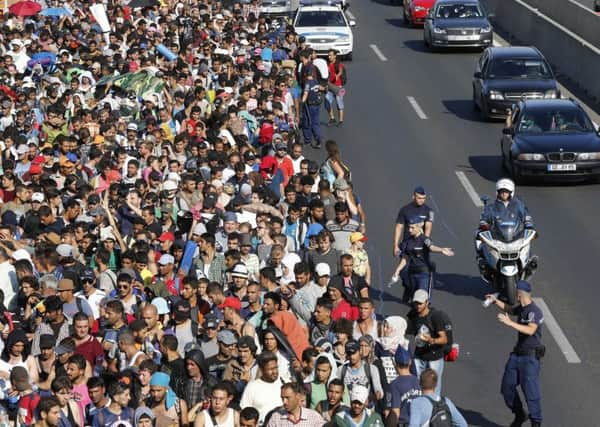Syrian refugees to make 100-mile march to freedom


A throng of people, carrying all their possessions in bags and rucksacks, set off on foot after the Hungarian authorities spent days preventing thousands of asylum seekers, many fleeing the war in Syria, from boarding trains to Germany and Austria. A second group of refugees, being held on a train in the north-western town of Bicske, surged through a police cordon and began running west along a rail track away from the migrant reception centre where the Hungarian authorities wanted them to register.
The moves came after thousands of refugees, from Asia, African and the Middle East, grew frustrated with the Hungarian government’s hardline refusal to grant them permission to seek sanctuary in Austria and Germany. The first sign of the exodus came at lunchtime yesterday when hundreds of migrants, who had set up a makeshift camp outside Keleti station in Budapest, gathered their belongings and snaked their way through the streets of the Hungarian capital, heading for the Austrian border 106 miles away.
Advertisement
Hide AdAdvertisement
Hide AdBy mid-afternoon a slow-moving column of people, half a mile long, had reached the M1 motorway outside the city.
In Bicske, the breakout by around 200 refugees took riot police by surprise. Officers’ attempts to block the migrants and push them back on to the train largely failed as the group, including elderly people and crying children, fled along the tracks.
Most of those marching yesterday hope to eventually reach Germany or elsewhere in western Europe. They are trying to avoid registering in Hungary, which is economically depressed and more likely to return them to their home countries than many western European nations. Under European law, asylum seekers will be approved or disapproved in the countries where they are first registered.
One man leaving Budapest said he expects the journey to Austria to take three days. Osama Morzar, 23, from Aleppo, Syria, was so determined not to be registered in Hungary that he removed his fingerprints with acid, holding up totally smooth finger pads as proof.
“The government of Hungary is very bad,” said Mr Morzar, who studied pharmacology at Aleppo’s university. “The United Nations should help.”
A couple from Baghdad, Mohammed and Zahara, who marched with a toddler, said they had been in a Hungarian asylum camp and got “roughed up” by guards because they refused to be fingerprinted. She said she has family in Belgium and is determined to seek asylum there.
Before the breakout at Bicske, hundreds had been sitting on a train, some with tickets they had purchased to Berlin or Vienna.
Although some eventually relented and registered at the asylum centre, most were determined not to. At some point, about 100 people left the train to wage a protest in front of a large number of television cameras and journalists. Using white paint, they wrote “no camp / no Hungary / Freedom Train” on the side of the train.
Advertisement
Hide AdAdvertisement
Hide Ad“The situation is so bad. We have so many sick people on the train. We have pregnant women, no food, no water,” said Adnan Shanan, a 35-year-old from Latakia, Syria, who said he was fleeing war in his homeland.
“We don’t need to stay here one more day. We need to move to Munich, to anywhere else.”
Mr Shanan, who bears scars on his arms that he says are from the fighting in Syria, claimed that authorities were denying them food and water but reporters saw police and civilian volunteers trying to deliver both to the train – and it being thrown back out the windows in view of television cameras. On a far side of the train, however, more than 30 men could be seeing eating baguettes delivered by police.
Across Europe, the refugee crisis is becoming more dramatic.
In Geneva, the UN refugee agency said yesterday that nearly 5,600 people crossed from Greece to Macedonia a day earlier, almost double the 2,500 to 3,000 per day in recent weeks.
“That is a dramatic number,” said UNHCR spokeswoman Melissa Fleming, saying it was the highest she’s yet heard.
Earlier yesterday, Antonio Gutierres, the head of the UN refugee agency, urged the EU to create a “mass relocation programme… with the mandatory participation of all EU member states” for recipients who clear a screening process.
He said a “very preliminary estimate” would be for the creation of at least 200,000 places to be added across the bloc.
Advertisement
Hide AdAdvertisement
Hide AdThe UN comments came a day after a round of recriminations among EU leaders. Hungary’s president Viktor Orban has said the human wave is a German problem, but German Chancellor Angela Merkel said the obligation to protect refugees “applies not just in Germany, but in every European member”.
Mr Orban reiterated on state radio yesterday his determination to stop the refugees.
“Today we are talking about tens of thousands but next year we will be talking about millions and this has no end,” he said.
“We can’t allow everyone in, because if we allow everyone in, Europe is finished. If you are rich and attractive to others, you also have to be strong because if not, they will take away what you have worked for and you will be poor, too.”